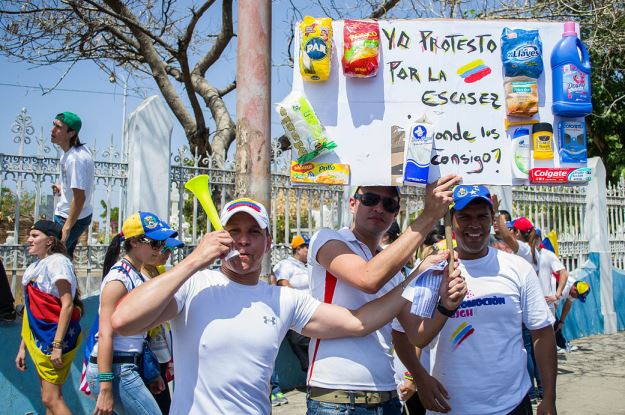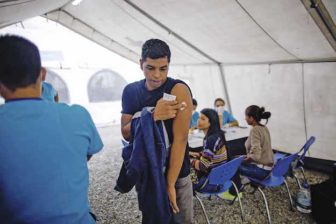Amid supermarket rationing and lines of empty store shelves, Venezuelans are taking day-to-day survival into their own… smartphones.
Twitter, Facebook, and messaging service WhatsApp have become go-to platforms for thousands of Venezuelans as they undertake the increasingly difficult task of finding and paying for everything from cooking oil to cancer medication.
@delmercadoencontre (“At the market I found”), a Twitter account that helps its more than 25,000 followers exchange information about what they can expect to find in nearby stores, is one example of how social media is helping people deal with the country’s economic crisis. The account’s founder, who asked not to be identified for fear of reprisal, told AQ that he started it after he was unable to find formula for his newborn daughter.
“At the beginning people saw our account as a joke, but as time passed and the situation got worse, the amount of followers skyrocketed,” he said. The account also has 500 followers on Telegram and 200 members in a WhatsApp group in which messages such as “Four boxes of milk per person in Plaza los Samanes, no ID required” help people avoid shopping trips that might leave them empty-handed.
As economic mismanagement and political instability have pushed Venezuela deeper into crisis, digital and social media have become an increasingly important tool for daily life; many in the country use Twitter, WhatsApp and the video broadcasting site Periscope to exchange security tips and get alerts about places to avoid.
But the proliferation of social media accounts created to barter household goods or exchange information about where to find supplies speaks to the increasingly difficult day-to-day circumstances faced by many Venezuelans. Posts like “I’ll trade black beans for cornmeal” or “My father needs 40mg of losartan” have become a regular part of the social media landscape.
On the streets of Caracas and nearby cities like Valencia, where the use of social media services is most prevalent, it is not uncommon to see people searching for bread in garbage cans or pulling mangoes down from trees. Armed national guards surround hours-long lines at supermarkets, and those not lucky enough to find what they’re looking for on the days they are permitted to shop (based on the last digit of their national ID) often turn to bachaqueros, who buy price-regulated products and illegally re-sell them for up to 100 times the original cost.
Cornmeal and cooking oil are also not nearly the only products that are hard to come by. Many medicines have become extremely scarce, to the extent that doctors have taken to prescribing veterinary medications for their (human) clients. As with the search for foodstuffs, a number of social media accounts have been created to help manage the crisis.
One of the most successful medicine location services that has arisen is Akiztá (the name is a play on “here it is” in Spanish). Founded in 2013 by Arturo Pérez, a 41-year-old Venezuelan who lives in Toronto, Akiztá is a free service that tells users which pharmacies have the products they are looking for, how much of it they carry, and the price. Ten affiliated pharmacy chains (a total of 315 stores) continuously update their information directly through the service. In addition to Akiztá’s 16,700 Twitter followers, some 200,000 Caracas residents use its app and 40,000 are registered on the web.
Other accounts connect people who are looking for drugs with those who want to donate them. For example, BOTica, a Twitter robot programmed by Mercy Benzaquen, a 22-year-old Venezuelan student at Columbia University, retweets peoples’ requests and offers, and puts them in touch when their needs coincide. @FundayudaTiaCruz offers a similar service, but without the robot. José Davíd Rodríguez created the Twitter handle last June and it now has 17,000 followers. “Our objective is to make the search for medicines more humane,” Rodríguez told AQ.
Polls show that 86 percent of Venezuelans blame the government for the scarcity that these services are designed to address, and most economists cite years of arbitrary expropriations and unrealistic price controls and exchange rates as the main causes. President Nicolás Maduro, for his part, blames an “economic war” that he alleges businessmen – backed by the U.S. – are waging against his regime. His response has been to raise the minimum wage and task his defense minister with normalizing the food supply.
In the absence of a clear plan to deal with the severity of shortages, the extent to which social media exchanges can help is limited. Claudia Mibellis, a product manager with Akiztá, told AQ that “people often call our offices saying ‘Why can’t I find this product?’ and it’s sad but I tell them it’s not a problem with the system but with the country’s situation.”
The founder of @delmercadoencontre echoed that sentiment. “Although there are all these social media tools available, it is not guaranteed that you will find what you need. It’s hard, so hard, to fight so much to gain just a single thing.”
Still, social media is making things easier for many Venezuelans. Luis Moreno, who started information exchange @yoestoybuscando (I’m looking for), says the growth of services like his is proof that people are committed to helping each other out.
“Social media is a help mechanism that is becoming effective nationwide,” Moreno told AQ. “In this unquestionable crisis that we are living, the Venezuelan spirit is alive.”
—
Krygier is an editorial intern with Americas Quarterly







